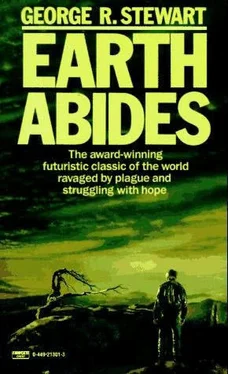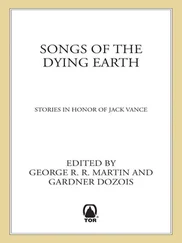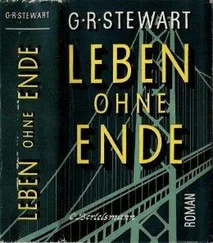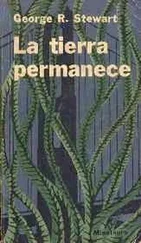After he had eaten a little and felt stronger, Ish looked around, and saw by the gutted ruins of a great building that they had camped on what had long ago been the campus of the University. Though he was still tired, he stood up curiously, and made out the shape of the Library a hundred yards or so distant. The trees around it had burned, but the building itself was still intact. Nearly all of its volumes, the whole record of mankind, would probably be still available. Available for whom? Ish did not try to answer the question that rose so spontaneously in his mind. In some way, the rules of the game had changed. He would not say whether they had changed for better or for worse. In any case, the Library—its preservation or its destruction—seemed to make very little difference in his thoughts now. Perhaps, this was the wisdom of old age. Perhaps, it was only despair and resignation.
“This will be a strange place for me to sleep tonight,” Ish thought. “Will the ghosts of my old professors move before me after all these years? Will I dream of a million books passing in endless procession, looking reproachfully upon me because after so long I have begun to have doubts in them and all they stood for?”
That night, however, though he often woke and was cold and envied the young men sleeping soundly, yet between times of waking he slept well and had no dreams, because he was very tired from all that had happened during the day.
In the dawn, when he awoke finally, he was weak but clear-headed.
“This is very strange,” he thought, “because in the last few years I know that frequently I have not been wholly conscious of what was happening, and that is the way a very old man often is. But now, as it was yesterday, I see everything very clearly. I wonder what this can mean?”
He watched the young men making breakfast ready. That same one was whistling gaily at the same tune, and again it brought to Ish the thought of little bells and happiness, although he could not remember its name. But still his mind was clear—“clear as a bell,” the old words came to him, since the idea of bells was already with him.
“I have heard,” he thought, putting the thoughts into silent sentences, as he had always had a habit of doing, and now as an old man was more prone than ever to do. “Yes, I have heard, or more likely I have read it in one of all those books—at least, from somewhere I have got the idea that a man’s mind becomes clear just before he is to die. Well, I am very old, and it is likely enough, and nothing certainly to be unhappy about. If I were a Catholic now and if things were different, I should wish to confess.”
Then by the little stream, with the smell of smoke still in his nostrils and with the old University buildings looming up around him, he thought for a moment of his life, and considered what he had piled up of sins and of virtues. For he realized that a man should make peace with himself, even though all conditions changed, and that a man should face the question of whether in his life he had satisfied the ideas which he had built up within himself as to what he should be, and that all this was not a matter of priests and religion but of a man himself.
After he had considered his life, he did not feel perturbed. He had made mistakes, but also he had sometimes done the right thing, as always—or at least in general—he had tried to do. The Great Disaster had placed him in a position for which he had no training; still he had accomplished certain things, and had lived, he trusted, not altogether ignobly.
Just then one of them brought him a morsel of something that had been roasted on a stick before the fire.
“This is for you,” said the young man. “It is the breast of a quail as you yourself, Ish, well know.”
Ish thanked him politely, and chewed at the meat, being glad that he had teeth left. The smoky tang of the open fire was in the meat, and the taste was delicious.
“Why should I consider dying?” he thought. “Life is still good, and I am the last American.”
But he did not bother to comment on anything that was happening or to ask questions as to what they would do that day. He felt in some strange way drawn from the world, although he was still so fully conscious of it.
After breakfast there came a shouting from farther down the stream, and soon a newcomer arrived. There was a long talk then, but Ish did not pay much attention. He gathered, in general, that the whole tribe was moving toward a place where there were some lakes and where the fire had not swept. It was very good country, according to what the newcomer said. The three young men who had been with Ish were at first inclined to argue about this, because they had not been consulted in the decision. But the other explained that the whole question had been put up before the assembly of The Tribe, and so decided. The three then yielded, granting that what The Tribe had decided was binding upon them also.
Though this was doubtless a very small incident, Ish found it particularly gratifying. That was something which he had taught them long ago. But the thought, though it was pleasant, also brought him sorrow and even embarrassment when he remembered Charlie.
Soon they made preparations to begin the march, but Ish was so weak that he could hardly walk at all. The young men then decided that they would carry him pickaback by turns, and so they started. Carrying him, they managed to move more rapidly than they had moved on the preceding day when he had walked. They made jokes, one with another, about how light an old man grew to be—happy jokes with a lusty vein running through them, as to why an old man was so light. But Ish at least was glad that he was no great burden upon them; in fact, one of them said that to carry the hammer was as heavy a load as to carry Ish himself.
Once they were moving in this fashion, perhaps the joggling of being carried pickaback affected Ish, and he found the fog again creeping in upon his brain. He did not even know just where they were going or in what direction they were moving. Only, now and then, some incident stood out clearly before him.
After a while they passed out of the burned area, and came to a part of the city past which the fire had swept, leaving it uninjured. From the dampness in the air which made him shiver a little Ish realized that the wind had changed and that this area must be close to the Bay. There were ruins of factory buildings in this section. Once he noticed the paralleled rust lines of a railroad track. Everything was much grown up with bushes and some tall trees, but the long dry summers had prevented the country from returning to forest, and so there was always a good deal of grassy expanse through which the young men had no difficulty in finding a way. Often, moreover, they followed the actual lines of streets where the asphalt still showed in places, in spite of the weeds growing up through its cracks and the grass encroaching upon its sides where the blown dust of all these years had supplied a skin of soil to the surface. But generally the young men seemed to steer more by the position of the sun or by some distant landmark than to make their way along the lines of streets.
As they were passing a thicket, something caught Ish’s eye, and he reached out his hand and cried for it, suddenly, as a child might. The young men saw what he was doing. They stopped, laughing merrily, to humor him. One of them went to get the thing for which he had cried out. When they brought it, Ish was delighted, and now they laughed at him as if he really were a child, good-naturedly.
Ish did not mind. He had what he wanted. It was a scarlet flower—a geranium, which had adapted itself to the new life and lived through these years. It was not the flower but the color, Ish realized, that had given him that sudden pang and made him cry out. There was not enough red in the world anymore. Being old, he could remember a world in which dyes and lights flamed with scarlet and vermilion. But now the world had sunk back into a quiet harmony of blues and greens and browns—and reds no longer blazed everywhere.
Читать дальше












